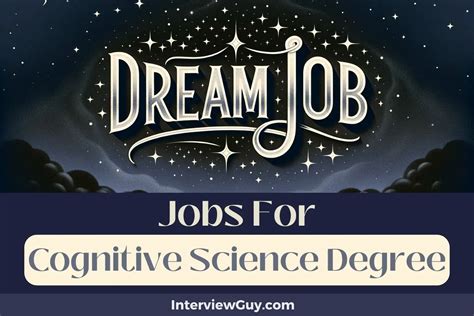Introduction

Cognitive science is an interdisciplinary field that explores the mind, behavior, and technology. It draws upon fields such as psychology, neuroscience, linguistics, computer science, and philosophy to understand how the human mind works and how it interacts with the world around us. Cognitive science jobs are in high demand as organizations seek to understand and leverage the power of the human mind.
Types of Cognitive Science Jobs
1. Cognitive Scientists
Cognitive scientists conduct research to understand the mind and behavior. They may specialize in areas such as perception, attention, memory, language, and decision-making. They work in academia, government, and industry settings.
2. Human Factors Engineers
Human factors engineers design products and systems that are easy and safe for people to use. They apply cognitive science principles to improve the usability and accessibility of technologies. They work in various industries, including automotive, healthcare, and aerospace.
3. User Experience (UX) Researchers
UX researchers study how users interact with products and services. They use cognitive science methods to understand user needs, preferences, and behaviors. They work in the technology industry, designing and evaluating user interfaces and experiences.
4. Artificial Intelligence (AI) Engineers
AI engineers develop and implement artificial intelligence systems. They apply cognitive science principles to create systems that can learn, reason, and make decisions. They work in various industries, including healthcare, finance, and transportation.
5. Cognitive Neuropsychologists
Cognitive neuropsychologists study the relationship between brain function and behavior. They use neuroimaging techniques to understand how cognitive processes are affected by brain injuries or disorders. They work in hospitals, clinics, and research centers.
Job Outlook and Salaries
The job outlook for cognitive science jobs is expected to grow rapidly in the coming years. According to the U.S. Bureau of Labor Statistics, the median annual wage for cognitive scientists is $121,660. Human factors engineers earn a median annual wage of $92,730, while UX researchers earn a median annual wage of $106,800. AI engineers can earn salaries well over $100,000.
Motivations for Pursuing Cognitive Science
1. Intellectual Curiosity: Cognitive science jobs offer the opportunity to explore the mysteries of the human mind and behavior.
2. Real-World Impact: Cognitive science research and applications have significant impacts on our daily lives, such as improving healthcare, transportation, and technology.
3. Collaboration and Innovation: Cognitive science jobs encourage collaboration between different disciplines, fostering innovation and creativity.
Pain Points in Cognitive Science
1. Ethical Concerns: Cognitive science research and applications raise ethical concerns about privacy, bias, and the potential misuse of technology.
2. Data Overload: The vast amount of data generated by cognitive science research can be challenging to manage and interpret.
3. Interdisciplinary Collaboration: Cognitive science requires collaboration between different disciplines, which can sometimes be challenging due to different perspectives and methodologies.
Effective Strategies for Success in Cognitive Science
1. Develop a Strong Foundation: Pursue a bachelor’s and/or graduate degree in cognitive science or a related field.
2. Gain Practical Experience: Participate in research projects, internships, or volunteer opportunities to gain hands-on experience.
3. Network and Attend Conferences: Attend industry events and conferences to connect with professionals in the field and learn about current research.
4. Stay Up-to-Date: Cognitive science is a rapidly evolving field, so it’s crucial to stay informed about the latest research and trends.
FAQs
1. What is the difference between cognitive science and psychology?
Cognitive science is a broader field that encompasses psychology, as well as other disciplines such as neuroscience, linguistics, and computer science.
2. Can I get a cognitive science job without a graduate degree?
Entry-level cognitive science jobs may be available to individuals with a bachelor’s degree, but most research and advanced positions require a graduate degree.
3. What are the applications of cognitive science?
Cognitive science has applications in various fields, including education, healthcare, transportation, and technology.
4. Is cognitive science a good career choice?
Cognitive science jobs offer intellectual challenges, real-world impact, and the potential for high earnings. They are suitable for individuals with an interest in the mind, behavior, and technology.
5. What is “cognoengineering”?
Cognoengineering is a term coined to encompass the practical applications of cognitive science principles to solve real-world problems.
6. What are the challenges in developing AI systems using cognitive science principles?
Challenges include creating AI systems that can handle complex tasks, simulate human emotions, and ensure ethical and responsible use.
Table 1: Cognitive Science Education Programs
| Institution | Degree Type | Program Length |
|---|---|---|
| Carnegie Mellon University | Bachelor of Science | 4 years |
| University of California, Berkeley | Master of Science | 2 years |
| Massachusetts Institute of Technology | Doctor of Philosophy | 5-7 years |
| University of Oxford | Master of Studies | 1 year |
Table 2: Cognitive Science Research Institutes
| Institute | Location | Focus |
|---|---|---|
| Max Planck Institute for Human Cognitive and Brain Sciences | Leipzig, Germany | Cognitive neuroscience, perception, language |
| Center for Cognitive Neuroscience | Minneapolis, USA | Memory, attention, decision-making |
| Wellcome Centre for Integrative Neuroimaging | Oxford, UK | Neuroimaging, computational modeling |
Table 3: Cognitive Science Applications
| Application | Industry | Purpose |
|---|---|---|
| Adaptive learning systems | Education | Personalized learning experiences based on cognitive models |
| Human-robot interaction | Robotics | Designing robots that can interact with humans in a natural way |
| Biometric security systems | Healthcare | Identifying individuals based on their cognitive characteristics |
| Personalized advertising | Marketing | Targeting ads based on consumer preferences and behavior |
Table 4: Pain Points in Cognitive Science
| Pain Point | Solution |
|---|---|
| Ethical concerns | Establish clear ethical guidelines and regulations |
| Data overload | Develop efficient data management and analysis techniques |
| Interdisciplinary collaboration | Foster communication and collaboration between different disciplines |
